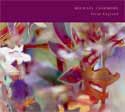Michael Cashmore, "Sleep England"
 This album is a collection of deceptively simple, melodic songs performed on electric guitar and bass by the composer and player who has worked his singular magic on so many of Current 93's most memorable records. Cashmore makes use of a minimal instrumental palette to create a suite of haunting melodies that seem stuck in some hazy, half-remembered, sepia-toned corridor of memory.
This album is a collection of deceptively simple, melodic songs performed on electric guitar and bass by the composer and player who has worked his singular magic on so many of Current 93's most memorable records. Cashmore makes use of a minimal instrumental palette to create a suite of haunting melodies that seem stuck in some hazy, half-remembered, sepia-toned corridor of memory.
I've often thought that Michael Cashmore was the quiet, unheralded genius looming in the shadows of David Tibet's long-running musical project. Current 93's finest moments—Thunder Perfect Mind, Of Ruine or Some Blazing Starre and All the Pretty Little Horses—seem utterly dependent upon Cashmore's ravishing and evocative melodies, drawing from diverse influences both modern and antique, fertile cross-breeds of mediaeval musical modes with British trad-folk, subtle nods to American influences and 1960s psych-folk revivalists. However, press for Current 93 seemed to focus mainly on David Tibet's idiosyncratic lyrical universe, or Steven Stapleton's audio mutations, and Cashmore's key contributions were often barely mentioned. This sad state of affairs was once again confirmed when the Castle/Sanctuary double-disc Current 93 anthology Judas As Black Moth was recently accidentally pressed with liner notes containing no mention of Cashmore's central, indispensible role in Current 93.
Cashmore released an EP and two albums as Nature and Organisation from 1994 to 1998 (one a collection of unfinished musical sketches), which featured Cashmore's songwriting and compositional skills along with a host of guest players and vocalists drawn from World Serpent Distribution's stable of apocalyptic folk luminaries. However, for Sleep England, Cashmore has pared it down to just one man and his guitar, stripping away layers of dense lyrical arcana and excessive knob-twiddling to reveal thirteen fragile and beautiful melodies that are simply constructed and simply executed, with the sort of poise and self-possession of which only a veteran artist is capable. In an independent record market that has lately become congested with scads of Fahey/Basho/Kottke-copping solo guitar albums, Sleep England is in a category by itself, with no obvious peers.
Avid listeners of Current 93 will immediately recognize Cashmore's trademark style on full display here; those poised, symmetrical melodic progressions of tenderly fingerpicked notes; hypnotic and lovely themes slowly revealing themselves over time. A sense of yearning prevails, along with a sense of glorious ravishment at these notes finding themselves in each other's presence. Cashmore lays it on thick and sweet, unafraid of reaching out for more beauty when it is appropriate, and holding back when the moment calls for a more skeletal outlining of melody. There are spaces between the notes on Sleep England, but they are often filled in with the guitar's own pulsating, organic reverb, as well as subtle background details: rickety unspooling drones or gentle textural murmurs, notes impressionistically smearing out into oblivion. Cashmore once again utilizes effects which give his guitar a sound not unlike a harpsichord, all the more appropriate for music that seems consciously to evoke mediaeval composition. Many of these tracks could not have been accomplished without overdubbing, but this doesn't detract from the feeling that the music is being played by one artist alone with his chosen instrument.
Unfettered by Current 93's darker lyrical themes, Cashmore is freed to explore the gentler, pastoral side of his art, occasionally veering towards the elaboration of precious and ear-pleasing pop melodies. Paradoxically, this seems to add even more of a melancholy cast to these songs, all of this ravishing beauty remaining unresolved; melting away into a distant, nebulous past of memories which continue to obscure over time. If anything negative could be said about Cashmore's album, it is that it becomes a touch repetitive over the course of thirteen songs. Not that the artist is guilty of self-plagiarism, but his style has such a signature sound—a single, coherent thread running through his work with Current 93 and Nature and Organisation—that it can't help but seem, at times, as if certain themes and progressions are all too familiar, especially since the instrumental palette differs so little. This is a small criticism, however, when I find myself lost in the sweet, nostalgic hinterlands of the album's title track, a studied evocation of an English neverland only glimpsed in vaporous, ephemeral memories.
samples:



